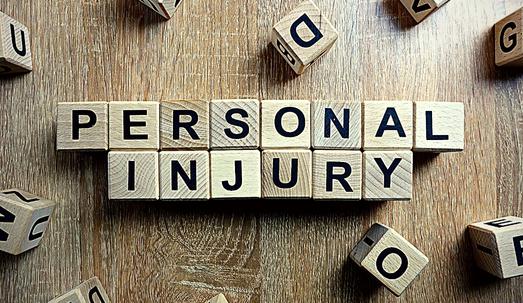Understanding the steps in a personal injury lawsuit can help you determine what to do after sustaining a serious injury. Between 300,000-500,000 accidents occur each year in the United States that result in a personal injury lawsuit. Over 52% of these claims are car accidents, but those are not the only types of accidents that result in injuries that can be filed for a personal injury lawsuit.

Table of Contents
What Is a Personal Injury Lawsuit?
A Personal injury lawsuit is the civil route that an injured victim can take to recover financial compensation from the party responsible for his or her injuries. The burden of proof lies with the victim to prove that the accident was due to the negligence of another party, and that it resulted in injury or death. If this can be proven to the court, then the injured party may be awarded damages. The claim might also be resolved through a settlement prior to trial.
Both awarded damages and settlements will include economic and non-economic damages. Economic damages are direct financial costs from accidents, such as past and future medical bills and lost wages. Non-economic damages do not have direct costs, but can still be assessed and awarded. This may include pain and suffering, loss of enjoyment of life, and scarring or disfigurement.
If the accident was due to gross negligence or occurred because of malicious intent, then punitive damages might also be included in the awarded amount from a trial. Punitive damages were created to help correct egregious behavior from recurring by the same party or others in a similar situation.
Some common accidents or injuries that can result in a personal injury lawsuit include:
- Motor vehicle accidents, which might include cars, trucks, motorcycles, or pedestrians.
- Workers’ compensation cases.
- Product liability claims, which includes cases for accidents caused by defective products.
- Slip and fall cases.
- Animal attacks and dog bites.
These are common accidents that can result in a personal injury lawsuit, but do not include all examples. Any accident that resulted in injury or death that was due to the negligence of another party should be reviewed by a personal injury attorney to see if it may qualify.
Most personal injury attorneys offer free case evaluations or initials consultations to review cases and answer questions. Many personal injury attorneys also work on what is known as a contingency fee basis, which means that the firm will not charge upfront for work on the case, but instead will be paid when the case has been resolved through a settlement or the awarded amount. The lawyer will take a percentage of the final amount, which is usually in between 33%-40%, depending on how difficult the case was to resolve. The more complex the case and the ligation involved will determine the final mount charged by the attorney or firm.
Communication That Should Be Avoided After an Accident
Accidents that happen due to the actions of another, whether it is a car accident, a slip and fall, or another injury due to negligence, can be costly. To help secure financial compensation, it is important to keep in mind what kind of communication the victim should avoid.
At the scene of the accident, it is proper for the victim to obtain the responsible party’s name and contact information, and some additional information as well, such as a driver’s license. Once that information has been obtained, the victim should not speak to the responsible party unless legal representation or a mediator is involved.
If the responsible party’s insurance company has an insurance adjuster reach out to discuss the case, the victim does need to be careful with his or her response. The adjuster may be friendly, but any answers he or she gets in response to the case may be used against the victim to disprove responsibility and deny the insurance claim. The victim should be firm but friendly in not answering questions, and should direct all communications through an attorney. Get the name of the insurance adjuster, along with his or her contact information, to pass along the attorney in charge of the case. This way, the victim can avoid the insurance adjuster taking a response to questions and twisting it to sound like the victim was somehow admitting fault for the accident.
The victim should also make sure that he or she does not discuss details of the case on any sort of social media or to outside parties. This might also be used by the opposing party to help disprove responsibility for the accident. Although not all communications might be admissible in court, it is best to not talk about the details of the accident to any outside parties.
What to Say After a Car Accident
A victim should discuss the case thoroughly with doctors or his or her attorney. He or she should be open and honest with the medical professional that treated the victim after the accident regarding all symptoms. Being upfront about all aches and pains after an accident can also help to identify, and diagnose, all injuries for treatment from the accident.
If delayed symptoms do occur after the accident, then it is best to go see a doctor and ask if the accident could be the cause of the problem. Victims should also answer all questions from the police officer that reported to the scene of the accident if one was required. The victim should mention any injuries or symptoms he or she may be experiences at the scene of the accident so that it will also be recorded in the police report.
Steps in a Personal Injury Lawsuit
What to Do Before Filing a Personal Injury Lawsuit
When any accident happens, the most important thing to do immediately after is to see if any party involved is injured. Seek medical treatment or call emergency services for serious or life-threatening injuries. If the injuries do not need immediate medical attention, and the scene of the accident is safe, then some of these steps can be taken to help ensure financial recovery:
- Get the name and contact information from the responsible party, including driver’s license and insurance policy for motor vehicle accidents.
- If there are any witnesses to the accident, get their name and contact information, so they can provide testimony if necessary.
- Collect evidence at the scene of the accident, which would include photos of the scene and the surrounding area, as well as road conditions. Also include photos of the damage that resulted from the accident, which could include both physical injuries and property damage. Write down details of the accident as clearly as possible, even the smallest of details can be helpful. Memory fades over time, so it is important to do this when details of the accident are fresh.
- Cooperate with the police if they are required to appear at the scene of the accident. The type and size of the damage in the accident may determine if the police will be necessary. If a police report is filed, follow up and request a copy, as this can be used to help determine who was liable for the accident.
- See a medical professional, even if it does not appear as if there are any injuries. Many accidents can cause injuries that do not have symptoms at the scene of the accident, but start to develop later and may be fatal if left untreated. Keep copies of any medical records and bills, and attend any recommended follow-up appointments.
- Consider having legal representation review the evidence collected to see if it qualifies for a personal injury lawsuit.
Negotiating a Settlement
Once a lawyer has decided to take the case, he or she can reach out to the insurance company of the responsible party to see if a settlement agreement can be reached. Most personal injury cases are resolved through a settlement after negotiations.
Insurance companies will try to deny as many claims as is possible, or will attempt to pay a lesser amount than what will cover all costs of an accident. If an initial settlement amount is offered to the victim, it is usually for a lower amount. This offer may not take into consideration all the future medical costs associated with rehabilitation. This may be especially be the case with injuries that result in a permanent disability that affects the victim’s ability to work for the rest of his or her life.
A personal injury lawyer can help to determine which party, if more than one is involved in the accident, is the responsible party. This liable party will be contacted with the proper notifications of the complaint. If the wrong party, or not all responsible parties, are not included, it will mean a loss of the damages that the victim may be entitled to in his or her case.
What Happens After a Lawsuit Has Been Filed?
Once a personal injury lawsuit has been filed, the case can take up to two years to go to trial and be resolved. The process of the personal injury claim begins with what is known as the discovery process. This part of the lawsuit can be one of the longer processes and might take up to a year, depending on the complexity of the case.
Discovery is when both sides exchange information about the accident and depose witnesses to gather statements to help determine who is at fault. The defendant’s attorney might also take this time to have the injured party see an independent medical professional to perform a medical evaluation. The victim might also have to answer questions that are presented by the opposing side through what are called interrogatories. This evidence is gathered by the defendant to attempt to disprove that he or she is at fault. He or she might try to blame anyone else involved in the accident, including the victim, when possible. If a business is involved in the accident, this part of the personal injury lawsuit can be important in proving who the responsible party is.
After the discovery process, both parties will attempt to see if a settlement agreement can be negotiated outside the court process. If a fair settlement cannot be agreed upon, then a mediator may be appointed to help with mediation. This is a neutral third party that does not give legal advice, but can help both parties. The final decisions are made by the parties involved and not by the mediator. If an agreement cannot be made by both parties, then the legal process will continue and the case will go to trial.
A trial is the final step in the personal injury lawsuit process. This is when evidence that has been collected will be presented to the jury. This can also include witness or expert testimony. Experts could include both medical professionals and professional accident scene reconstructionists. For a personal injury case, the victim does not have to prove that the responsible party was 100% at fault, only that he or she is over 51% at fault for the accident. This is enough to be awarded personal injury damages by the jury.
How Long Do I Have to File a Lawsuit?
Typically, when an accident occurs, the timeframe to be able to file a personal injury lawsuit begins to run. This is what is known as a statute of limitations, and once this time has passed, the victim is no longer able to file a personal injury lawsuit to recover damages. There are some exceptions to this rule that can be applied to extend the time to file a personal injury lawsuit. A personal injury attorney can advise of the state’s rules on statute of limitations, as state laws do vary.





